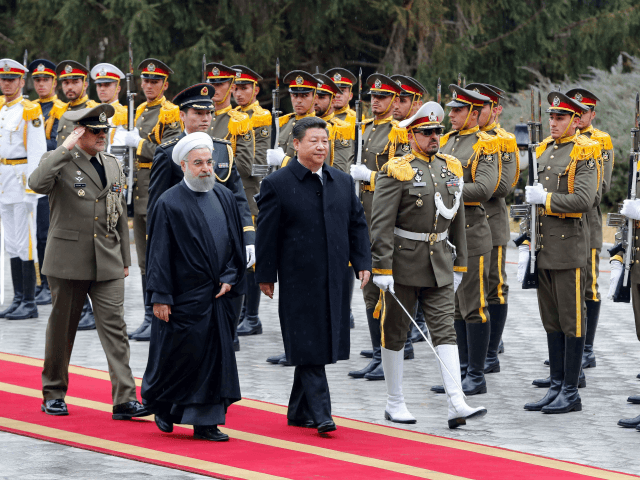Chinese officials and state-run media denounced the new round of U.S. sanctions against Iran after they took effect on Monday, accusing the Trump administration of “bullying” Tehran and vowing to continue purchases of Iranian oil.
“China opposes unilateral sanctions and long-arm jurisdiction,” Chinese Foreign Ministry spokeswoman Hua Chunying said on Monday.
“We believe that China’s normal cooperation within international law is legal and legitimate, and this shall be respected,” Hua added, signaling that China does not intend to scale back its business with Iran even after a temporary waiver from Iran sanctions officially granted on Monday expires.
She said China continues to support the Iran nuclear deal and expressed Beijing’s hope that “all parties can bear in mind the larger picture and fulfill their duties and choose to stand on the right side of history.”
China’s state-run Global Times denounced the new round of Iran sanctions as “bullying” in a Tuesday editorial, predicting the U.S. would be “isolated” by its determination to maintain sanctions.
The Global Times also admitted China’s opposition to the new sanctions was mitigated by the waiver it received and conceded China reduced its Iranian oil imports to avoid “serious disputes” with the United States.
The Chinese paper gave Iran unquestioning credit for honoring the nuclear deal, describing the regime in Tehran as a “partner” and a vital source of oil for Asian nations:
International affairs are complicated. As an independent force in the world, China needs to formulate its policies based on the facts. China doesn’t want to confront any party and would like to play an active role in resolving disputes, protecting the truth and carrying forward international justice. In the meantime, China’s interests should be respected.
The deterioration of the Iranian situation has just begun. We hope that Washington will restrain its rash acts. These sanctions against Iran face many challenges as they lack legal basis and hurt too many countries. Washington will suffer if it underestimates the challenges.
Josh Rogin at the Washington Post said on Tuesday that despite Beijing’s complaints about renewed Iran sanctions, China is poised to profit from undermining President Trump’s policy by “playing Washington and Tehran against each other and making a ton of money in the process.”
As with the Global Times editorial, Rogin acknowledged there is evidence China is “playing ball” with Trump by significantly reducing imports of Iranian oil, but in the long term China will end up enjoying cheap oil from Iranians eager to keep its business, while also benefiting from restrictions on how Iran can spend its oil money:
“China has Iran over a barrel,” said Mark Dubowitz, executive director of the Foundation for Defense of Democracies. “U.S. sanctions mean Beijing can force Iran to give them discounts on Iranian oil they do buy while selling Chinese goods to Tehran at inflated prices paid from the restricted Iranian oil funds sitting in escrow accounts at Chinese banks.”
In many cases, these are Chinese goods that Iran doesn’t even want, Dubowitz said. But because European companies are actually cutting off their oil business with Iran — and China is not — Iran is becoming more and more dependent on the Chinese market and therefore more vulnerable to Chinese tactics.
“Sanctions work best when they encourage people to act in their own self-interest,” said Dubowitz. “These sanctions empower Chinese traders to do what they do best: Squeeze those with less negotiating leverage.”
Another opportunity for China could appear if the U.S. is able to lock Iran out of the SWIFT financial transaction system, which on Monday announced that several Iranian banks have been suspended from the service. This could inspire China to create an alternative to SWIFT, possibly working in concert with Russia, that would diminish the influence of the U.S. dollar.
The Wall Street Journal on Tuesday looked at fluctuations in the oil market presently signaling confidence in global supply chains with surprisingly low prices, and speculated that some of the experts expecting the Iran sanctions to backfire are missing an important variable: rapidly growing American oil exports:
If global economic growth doesn’t slow due to a trade war and if sanctions tighten considerably next spring, the first half of 2019 could see a significant rebound in prices. That might be short-lived, though, because U.S. output is expected to roar ahead by mid-2019.
Iranian output fell by 1 million barrels a day from peak to trough under the previous nuclear sanctions. Once global output can fully replace Iran’s blocked exports – perhaps next summer – the sanctions could get far tougher.
Next summer will arrive right about the time Monday’s temporary waivers for eight Iranian oil customers, including China, will expire.

COMMENTS
Please let us know if you're having issues with commenting.